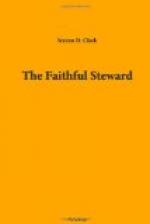6. That God made us to be almoners of his bounty to others. Reciprocity is the pillar of every social system; it is of the human family. This principle was practically developed in Eden. On this ground, Paul argued that there should be equality between those who are in want and those who have abundance. (3 Cor. viii. 14.) Every man was designed to stand like a conductor of the electric fluid, to convey the influences of heaven to those around him. Our Creator has made the duty of benevolence as obligatory as that of justice. One is as much bound to help other, and thus, unless in very extreme cases, to contribute of his substance for the benefit of the needy, as to be honest. When, therefore, we pass a portion of the good things of life to others as they are conveyed to us, we are fulfilling the great end of our social being; when we grudgingly retain it, we are defeating that end. This sentiment must be riveted in our minds. It is a hard lesson for selfish men to receive; yet it must be learnt. It is indeed the noblest idea of our natures; the link that unites us to purer intelligences.
7. A lively remembrance of the Source of our blessings; realizing that they are all streams from the Father of mercies. Had he been other than Jehovah, they would long ere this have been stayed. For how have we sinned, and forfeited every claim to good; and yet he has continued to uphold and refresh us. We have repeated the sin, and under aggravated form,—abused his bounties, despised his Son, grieved his Spirit, disregarded his warnings, and slighted his entreaties; and still his blessings have continued to flow as if nothing could provoke him to withhold them. What unutterable goodness! What exhaustless mercy! Surely the gifts of such mercy should be devoted to the works of mercy; and how more appropriately than in aid of that wondrous scheme which the agonized Jesus died to accomplish? While we enjoy our blessings, let us turn our eyes upward to the overflowing Source, and while we gaze, let the streams of gratitude gush forth. As we have freely received, freely let us give.




